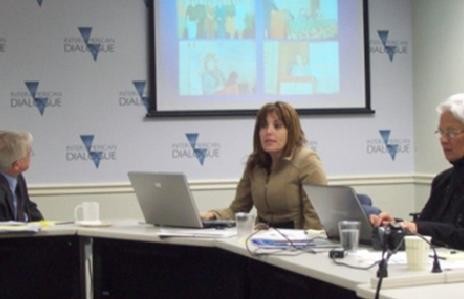
Developing Networks for Reform
PREAL reviews broad spectrum of its activities and discusses priorities for improving education policy in the coming year.
This post is also available in: Spanish
On March 13 and 14 in San Jose, Costa Rica, the Central America and Dominican Republic Chapter of PREAL’s Working Group on the Teaching Profession (CCAD-GTD) held, in collaboration with the Central American Integration System’s Education Coordination (CECC/SICA), the first of seven national workshops on the teaching profession that PREAL will organize throughout the region.
These workshops seek to promote debate on teacher policy and showcase innovative policies, such as standards for entry into the profession, systematic induction of novice teachers, and performance evaluations.
The workshop brought together representatives from Costa Rican organizations with an interest in the teaching profession. Maria Eugenia Paniagua, Secretary General of CECC/SICA; Jose Luis Guzman, Coordinator of PREAL’s CCAD-GTD; and Marcela Gajardo, Co-Director of PREAL, each commented on the challenges they see in improving education in Costa Rica and the region. Paz Portales of UNESCO’s Regional Office for Latin America and the Caribbean gave the first presentation of the day, discussing the global activities of UNESCO and the potential for cooperation within the region to strengthen teacher training, school management, and educational culture. Beatrice Avalos of the University of Chile’s Center for Advanced Education Research (CIAE) then discussed the need to regulate teacher training institutions, making sure they meet high standards and provide skills crucial to effective teaching.
National Views & Voices
A panel featuring Yolanda Rojas of the University of Costa Rica, consultant Jesus Ugalde, and Congresswoman Maria Eugenia Venegas discussed the need for establishing a target teacher recruitment profile, recognizing the role that education systems play in preparing students to compete in the global economy. They also stressed the importance of engaging civil society in demanding policy reform and of compensating for how external factors such as a change in political administrations can complicate the role of teachers. Gilberto Alfaro, Project Director for Initial Teacher Training at CECC, moderated the discussion. Guzman closed the first day of discussion by stressing that while the region faces challenges in terms of access and efficiency even in primary education, it also needs to focus on the quality of education and should shift its focus from “education for all” to “learning for all.”
Local experts Luis Carlos Morales, a sociologist at the University of Costa Rica, and Soledad Chavarria, owner of an educational consulting firm, opened the second day’s activities as part of a panel moderated by Juan Manuel Esquivel, an expert in student assessment. Morales discussed how the debate on education in Costa Rica is changing to incorporate such new issues as an open economy, growing exports, increasingly unequal access to education, less public funding, expanding numbers of private educational institutions, a saturated teacher market, and the deterioration of teaching conditions. He argued that Costa Rica must improve teacher training opportunities and candidate prerequisites, raise institutional accreditation standards, and open discussions on teaching conditions. Morales stressed that reforms will fail if they focus only on economic goals and do not consider the quality of education.
Chavarria highlighted key findings from the third report of “Estado de la Educación,” which is produced by the State of the Nation Program (Programa Estado de la Nación) and assesses the state of schools and education in Costa Rica. Like Morales, she focused her discussion on teachers and their working conditions, institutional accreditation, and government efforts to improve education. She emphasized that the lack of a target profile for teacher candidates, unacceptable teaching conditions, the lack of an official induction period, and a negative view of teaching as a profession all hinder the quality of education. Generating effective school leadership and establishing an organization to define and monitor the quality of education are crucial to developing high-quality teachers. By strengthening teacher opportunities and working with actors from various social sectors – such as training institutions, teachers unions, and the ministry of education – Costa Rica can work to raise the status of the teaching profession.
Minister Garnier Speaks
Minister of Education Leonardo Garnier closed the workshop, noting that both educators and the Ministry need to better understand the processes of teaching and learning. Contrary to common understanding, changes in global views and practices makes teaching today more challenging than ever before. Teachers should not be expected to be simple content managers but should provide young learners with the skills to become informed citizens who can contribute to their society. An important way to provide students with an integral approach is to recognize the value of arts and other fields in school curricula as a complement to traditional skills. In addition to proper training, teachers require proper tools to provide support to students as they develop both academically and socially.
PREAL reviews broad spectrum of its activities and discusses priorities for improving education policy in the coming year.
How to advance toward the desired outcomes of improving the teaching profession.
Progress of Latin American countries and the Caribbean towards the six Education for All goals.
